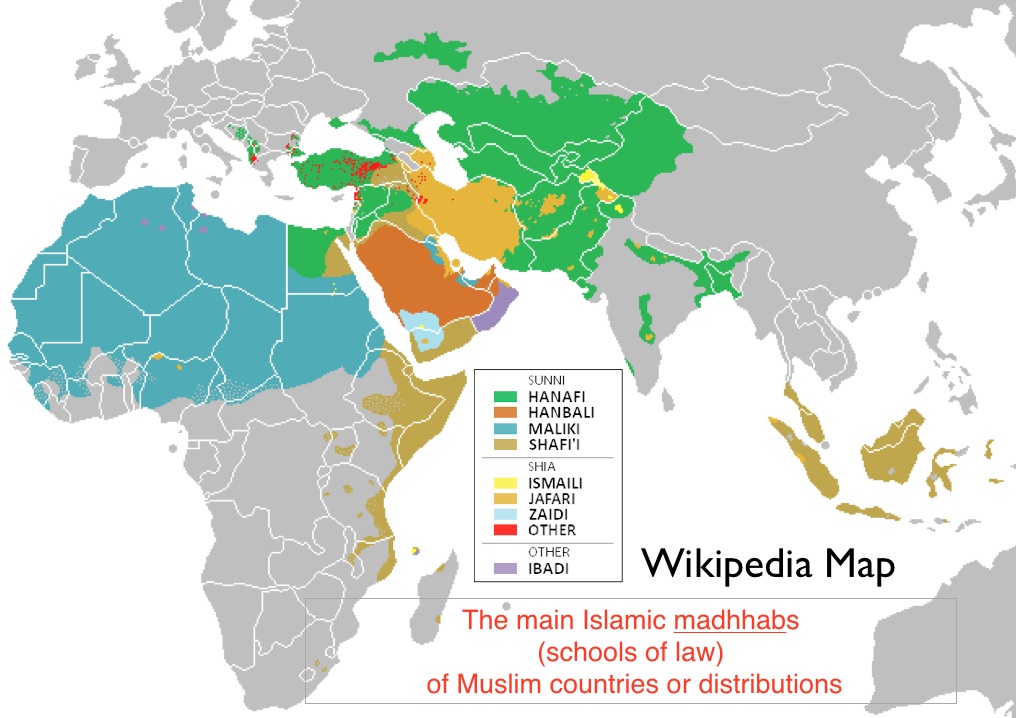Not known Facts About Barelvi
Wiki Article
The Basic Principles Of Barelvi
Table of ContentsNot known Incorrect Statements About Barelvi The Greatest Guide To BarelviThe 10-Minute Rule for BarelviHow Barelvi can Save You Time, Stress, and Money.
Radical Islamist groups in South Asia such as the Taliban are frequently categorized as Wahhabis, belonging to the austere, puritanical kind of Islam institutionalized in Saudi Arabia. Yet while the ties in between the Wahhabis as well as the Taliban are tight, the last actually come from a various branch of the faith.Sunni Islam is separated right into 4 orthodox colleges of law (Madhhabs), each of which is complied with in unique components of the Muslim world. A number of rites as well as petition forms likewise differ amongst the schools. As the map over suggests, Wahhabism, based in Saudi Arabia, is associated with Hanbali law, the most strict type of Islamic jurisprudence.
" Sunni Muslims," Haqqani composes, have actually discarded their aversion to Wahhabi teams, creating a a great deal of standard Sunnis that embrace Wahhabi political and jihadi concepts without necessarily surrendering their ceremonies and rituals." As is typically kept in mind, Saudi Arabian spiritual funding has actually aided break down the obstacles in between the 2 sects.
What Does Barelvi Mean?
Mapping the 4 basic schools of Sunni Islamic regulation is fairly simple, although the writers of the Wikipdia map posted over deserve commendation for doing a specifically excellent job. But the distinctions that really matter are not those of Madhhab, but instead are discovered amongst less formal and also far more recent "movements" within Islamic idea and technique.The Deobandi movement is straightened with Wahhabism as well as advances a similarly extreme, puritanical interpretation of Islam. The Barelvi movement, in comparison, defends a much more conventional South Asian version of the belief focused on the practices of Sufi mysticism. In India and also especially Pakistan, tensions between both teams can be extreme, often verging on open war.
As recently reported in the, "When the Taliban took over Buner in April 2009, they initially besieged Pir Baba's shrine. Taliban leader Fateh Khan claimed it was since the area was a hub of 'adultery and idolatry.'" Therefore, numerous Sufi temples are currently heavily secured by Pakistani safety forces.
One can, nevertheless, conveniently depict their place of origin, as both activities are called for towns in northern India: Deoband as well as Bareilli. Although radical Deobandi groups are most closely connected with Pakistan as well as Afghanistan, the activity's intellectual and also spiritual heart is still the Indian city of Deoband. Its Darul Uloom Deoband is considered to be the 2nd largest madrasah (spiritual college) in the Sunni Muslim globe, complying with just Al-Ahzar in Cairo.
Barelvi Fundamentals Explained
Although firm numbers are impossible to locate, many specialists maintain that Barelvis significantly out-number Deobandis not simply among Indian Muslims yet in Pakistan as well. In Pakistan, however, Deobandis have been progressing of late, and also Barelvis pulling back. According to one quote, "some my site 15 per cent of Pakistan's Sunni Muslims would certainly consider themselves Deobandi, as well as some 60 percent remain in the Barelvi practice.Early Deobandi leaders were troubled by the triumph of British manifest destiny and also English-language education and learning, which they sought to combat by purifying their faith, stripping away magical methods as well as various other advancements that they considered as in contrast to the confidence (Barelvi). The most hardline Deobandis involved regard Barelvis, as well as Shiites, as non-Muslim opponents deserving of attack.
Deobandi reasoning is too standard to be nationalistic, concerning the neighborhood of the faithful, not the contemporary nation-state, as the appropriate Quranic political vehicle. A lot of Deobandi scholars rejected the partition of British India in 1947, favoring to seek the spread of Islam in a concentrated India. The suggestion of Pakistan, furthermore, was originally welcomed by Muslim teams disliked by the hardline Deobandis (Barelvi).
Over time, nonetheless, received Sunni Islam involved control Pakistan. Head Of State Muhammad Zia-ul-Haq (1978-1988) functioned hard to transform Pakistan into a fundamentalist Sunni state, formally proclaiming the heterodox Ahmadis to be non-Muslims. Therefore, the Pakistani government progressively veered towards the extreme Deobandi movement. The connection, nonetheless, is a two-edged sword for modern-day Pakistan, as the Deobandi faithful eventually have ridicule for national identifications and also borders.
Examine This Report about Barelvi
Critics connect it to terrorist organizations; the Taliban, nevertheless, uprised of Deobandi madrasahs in northeastern Pakistan, as did a number of various other violence-prone companies. Horrendous fatwas (religious rulings) you can try this out do not assist its credibility. In May 2010, a mandate that females can not work for incomes shocked mainstream Muslim opinion worldwide. (The described it as a "Talibanesque fatwa that stank of tribal patriarchy.") Much more embarrassing was the 2006 "fatwas for money" bribery scandal, which was revealed by an Indian tv sting operation.

As Abedin composes: On the question of so-called Wahabism I put it to Madrassi that several critics of the Deoband seminary claim that Deobandi beliefs are just a small step far from full-blown Wahabism. In action the replacement Vice Chancellor makes a clear separation in between both institutions of idea, before including that if we think about the Wahabis and the Barelvis as 2 extremes, the Deobandis inhabit the centre ground because continuum.
Report this wiki page